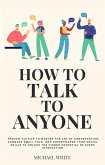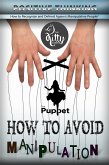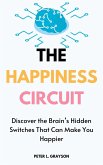Imagine waking up one day and realizing that the thoughts swirling in your head are not entirely your own. You have ideas, desires, and even fears that have been implanted by sources you barely notice. You scroll through social media, you watch the news, and suddenly your opinions align perfectly with what you've consumed. It happens gradually, unnoticed, until you're not sure where your thinking starts and where outside influence takes over.
The modern world is full of invisible forces that shape how we think, what we value, and how we behave. Some of these forces are easy to identify: advertising, peer pressure, and social media influencers trying to sell us a new product or idea. Others are subtler, woven into the fabric of our daily lives in ways we hardly recognize. These dirty tricks, as they are often called, operate behind the scenes, controlling how we make decisions, how we perceive others, and even how we view ourselves.
It's a game of control, and whether you know it or not, you are a participant. Every day, your brain is bombarded with information designed to sway your thinking in one direction or another. The food you eat, the clothes you wear, the people you trustall these decisions are influenced by factors that you're often not even aware of.
The first step to breaking free from these tricks is recognizing that they exist. Many of us walk through life convinced that our thoughts are entirely our own, shaped by nothing but logic and personal experience. But in reality, we are all subject to the same psychological vulnerabilities that leave us open to manipulation. These tricks work because they tap into deep-rooted instincts and biases that are hardwired into our brains. Once you understand how they work, you can begin to avoid their influence and take back control of your mind.
THE PSYCHOLOGY OF INFLUENCE
At the heart of every dirty trick used to control your mind is a basic understanding of how human psychology works. Our brains are designed to take shortcuts. Every day, we are faced with an overwhelming amount of information, and it would be impossible to process it all in detail. Instead, we rely on mental shortcutsheuristicsthat help us make quick decisions without overthinking. These shortcuts are helpful in many cases, but they can also be exploited.
For instance, the "availability heuristic" is a mental shortcut that causes us to overestimate the importance of information that is readily available. If you see news reports about airplane crashes, for example, you might start to believe that flying is far more dangerous than it actually is. In reality, the chances of being in a plane crash are minuscule, but because the information is available and memorable, your brain gives it more weight than it deserves.
Advertisers and politicians know how to exploit this heuristic. They bombard us with memorable, emotionally charged messages that are designed to stick in our minds. Over time, these messages shape our beliefs and behaviors, often without us realizing it.
Another mental shortcut that can be manipulated is the "social proof" bias. This is the tendency to believe that something is true or good because other people believe it. It's the reason why people tend to follow the crowd, even when they know better. If you see a restaurant with a long line outside, you might assume it's good and join the line, even if you've never heard of the place before.
Social proof is a powerful tool used by marketers, influencers, and media outlets. They know that if they can make something appear popular or widely accepted, people will be more likely to go along with it. This is why you often see products labeled as "best-selling" or "most popular," even if the claim is dubious.
The modern world is full of invisible forces that shape how we think, what we value, and how we behave. Some of these forces are easy to identify: advertising, peer pressure, and social media influencers trying to sell us a new product or idea. Others are subtler, woven into the fabric of our daily lives in ways we hardly recognize. These dirty tricks, as they are often called, operate behind the scenes, controlling how we make decisions, how we perceive others, and even how we view ourselves.
It's a game of control, and whether you know it or not, you are a participant. Every day, your brain is bombarded with information designed to sway your thinking in one direction or another. The food you eat, the clothes you wear, the people you trustall these decisions are influenced by factors that you're often not even aware of.
The first step to breaking free from these tricks is recognizing that they exist. Many of us walk through life convinced that our thoughts are entirely our own, shaped by nothing but logic and personal experience. But in reality, we are all subject to the same psychological vulnerabilities that leave us open to manipulation. These tricks work because they tap into deep-rooted instincts and biases that are hardwired into our brains. Once you understand how they work, you can begin to avoid their influence and take back control of your mind.
THE PSYCHOLOGY OF INFLUENCE
At the heart of every dirty trick used to control your mind is a basic understanding of how human psychology works. Our brains are designed to take shortcuts. Every day, we are faced with an overwhelming amount of information, and it would be impossible to process it all in detail. Instead, we rely on mental shortcutsheuristicsthat help us make quick decisions without overthinking. These shortcuts are helpful in many cases, but they can also be exploited.
For instance, the "availability heuristic" is a mental shortcut that causes us to overestimate the importance of information that is readily available. If you see news reports about airplane crashes, for example, you might start to believe that flying is far more dangerous than it actually is. In reality, the chances of being in a plane crash are minuscule, but because the information is available and memorable, your brain gives it more weight than it deserves.
Advertisers and politicians know how to exploit this heuristic. They bombard us with memorable, emotionally charged messages that are designed to stick in our minds. Over time, these messages shape our beliefs and behaviors, often without us realizing it.
Another mental shortcut that can be manipulated is the "social proof" bias. This is the tendency to believe that something is true or good because other people believe it. It's the reason why people tend to follow the crowd, even when they know better. If you see a restaurant with a long line outside, you might assume it's good and join the line, even if you've never heard of the place before.
Social proof is a powerful tool used by marketers, influencers, and media outlets. They know that if they can make something appear popular or widely accepted, people will be more likely to go along with it. This is why you often see products labeled as "best-selling" or "most popular," even if the claim is dubious.
Dieser Download kann aus rechtlichen Gründen nur mit Rechnungsadresse in A, B, CY, CZ, D, DK, EW, E, FIN, F, GR, H, IRL, I, LT, L, LR, M, NL, PL, P, R, S, SLO, SK ausgeliefert werden.









